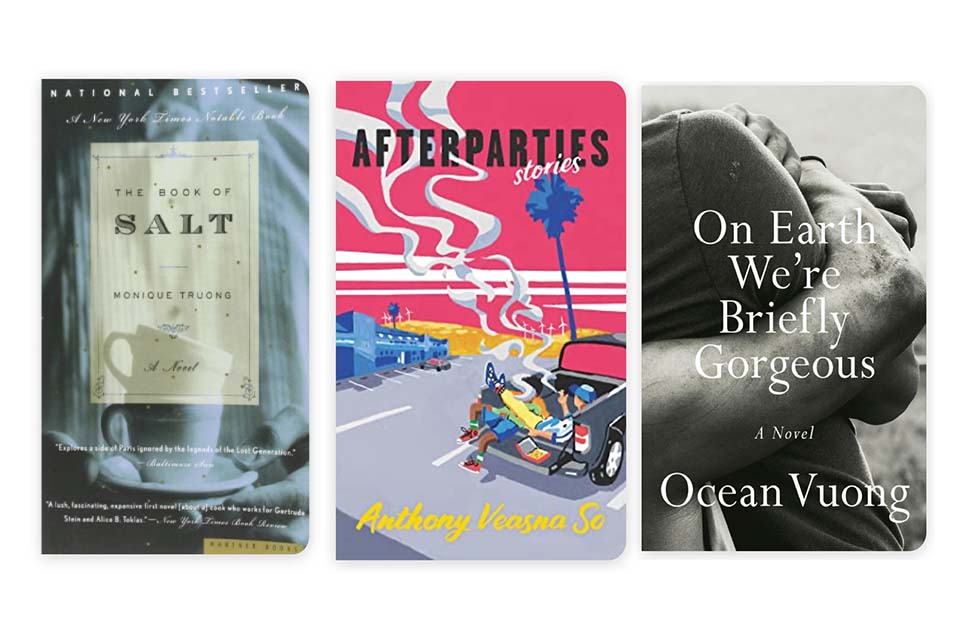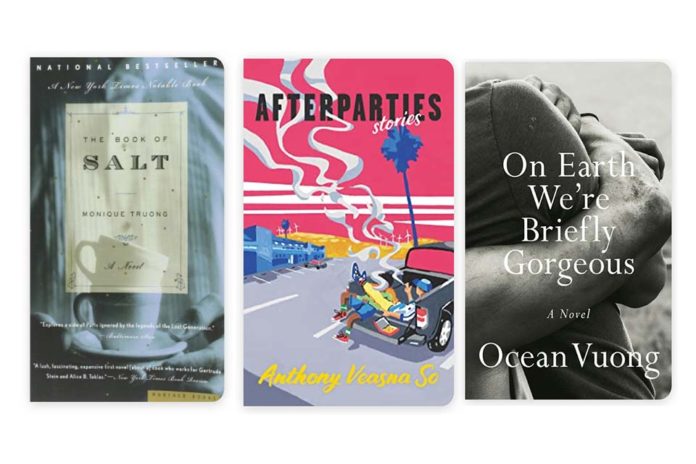Highlighting Asian American authors

The Book of Salt, Afterparties and On Earth We’re Briefly Gorgeous were just three books discussed in this course.
June 28, 2022
In many high schools across the country, there is a lack of representation of Asian voices in classroom literature. Not only in character storylines, but also among the authors selected.
“I have Asian American students who go through 12 years of education without ever reading authors who share identities with them,” said Grace Talusan, the Fannie Hurst Writer-in-Residence.
Howie Tam, the Florence Levy Kay Fellow in the Anglophone Literature and Film of the East Asian Diaspora, focuses on a diverse representation of authors throughout his Introduction to Asian American Literature course. Below, ten students from Dr. Tam’s class explain their favorite titles from the course.
“In her sorrowfully moving novel ‘Bone,’ Fae Myenne Ng asks us what it means to be at home. What does it mean to feel at home within ourselves? To mark a place as our own? “Bone” offers us a portrait of San Francisco’s Chinatown, home to an immigrant family who grieves the death of a loved one,” said Claire Hou ’23. “To readers grappling with questions of identity and belonging, Ng charts a watery course through a story that lends tremendous insight to anyone who is on a journey to finding their way home.”
“A book I’d recommend is Jhumpa Lahiri’s ‘The Interpreters of Maladies.’ I found the short story format and Lahiri’s writing style leading the content to be easily digestible, but also each story offers different perspectives on the immigrant experience, both first and second generation, and more,” said Vincent Lian ’25. “As a second generation immigrant, I found the themes explored in the story to be extremely relatable, and I think anyone reading from will learn greatly about the immigrant experience.”
“It is difficult to decide between Eric Tang’s ‘Unsettled: Cambodian Refugees in the New York City Hyperghetto,’ Faye Myenne Ng’s ‘Bone,’ Anthony Veasna So’s ‘Afterparties,’ and Ocean Vuong’s ‘On Earth We’re Briefly Gorgeous.’ Though I’m more partial to ‘Unsettled’ by Eric Tang, as it gives a more sociological view into the Southeast Asian American experience and additionally centers the Cambodian community,” said Amy Schroder ’23. “I especially appreciate the historical lens Tang uses to critique America’s racial capitalism and how Cambodians fit into this as new refugees in a post-slavery America. Despite this fraught reality, Tang’s use of interviews also lends a literal voice to the community and showcases the resilience of Cambodian refugees in the Bronx; which serves to challenge the political amnesia of the genocide as the work itself is a testament to memory.”
“I think Sui Sin Far’s ‘Mrs. Spring Fragrance’ is a great collection that showcases Asian American experiences. Many stories provide insight on how Asian American immigrants navigate their identities as not only Asian immigrants, but also as Americans too,” said Eric Hu ’23. “Furthermore, it also explores that racial persecution of Asians isn’t a new problem that has only recently started, but one that has been festering for centuries in the United States.”
“I want to suggest Maxine Hong Kingston’s novel ‘Tripmaster Monkey: His Fake Book.’ The reason why I have suggested it is because of its successful mingling of Chinese or, more specifically, Cantonese and English, and the Americanization of Chinese legends,” said Chris Yu ’23. “I believe she is very good at reimagining the Chinese American community.”
“I was recently talking with my sibling about the importance of recentering the Vietnam War narrative around actual Vietnamese people, rather than solely on American veterans as it is so commonly framed in the United States. My sibling’s high school English class is reading Tim O’Brien’s ‘The Things They Carried,’ which I do think is a good book that discusses important stories, but does not come close to encapsulating the impact of the Vietnam War on all parties. Several books that we read in Dr. Tam’s class last semester that I think convey a very different perspective are ‘Catfish and Mandala’ by Andrew X. Pham, ‘On Earth We’re Briefly Gorgeous’ by Ocean Vuong, and ‘The Gangster We’re All Looking For’ by Le Thi Diem Thuy,’ said Holly Newman ’22. “I’ve also been recommending ‘Afterparties’ by Anthony Veasna So and anything by Chang-Rae Lee to everyone I know recently, because I think these authors’ styles are incredibly effective in forcing the reader to confront the extremely harsh realities of war, trauma and its aftermath.”
“Maxine Hong Kingston’s ‘China Men’ tells the story of Chinese laborers, especially reclaiming her father’s Chinese immigration story, while highlighting the often repressed history of Chinese Americans,” said Bonnie Chen ’24. “Kingston’s powerful prose aims to make the assertion that Chinese Americans have a story to tell — providing an overarching view of the impact Chinese Americans have had on America.”
“I believe Monique Truong’s ‘The Book of Salt’ gives important insights about Asian American culture and history to an assumed reader who’s completely unfamiliar but interested in Asian American literature. I think someone should read it because the story captured my attention with following a gay cook, Binh, on his experiences in Vietnam and France during the early 1900s. They would get to dive into learning how the colonial system, even after its collapse, continued to affect the relationships between Vietnamese people, Europeans, and Americans,” said Charlotte Li ’24. “I could not speak more highly of this book! If you love food like me, you’ll love also getting to visualize the scenes involving the love, blood, and sweat that go into preparing the dishes.”
“There are many novels that describe the experience of Asian Americans in the course of the United States’ history,” said Jessica Fowler ’25. “One novel I particularly enjoyed was ‘The Surrendered’ by Chang-Rae Lee. This book describes the experience of a woman through her teenage years from the Korean war through her life in America. It provides a whole new perspective of Asian American experience that may not be talked about enough and the theme of survival is very interesting throughout the entire novel that is portrayed in the many interesting characters.”
“My favorite text from the course (and the one I recommend the most) is ‘Afterparties’ by Anthony Veasna So. As a college student, I found it the most relatable and I love that the stories span across generations to provide a contemporary perspective on the intersections of sexuality, Asian American identity, poverty, and technology, among many other things,” said Layla Hay ’25. “I also appreciate that the author is Khmer, and most of the characters are Cambodian-American, as I feel like Southeast Asians are often erased from the mainstream AAPI narrative. That being said, all of the books we read in this course bring something unique and significant to the table when it comes to ‘understanding the AAPI experience’ in literature, so I would strongly encourage you to expand your reading beyond a single book (I would also recommend you take the actual course or other courses in the AAPI studies department!).








